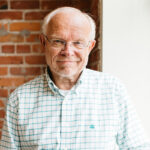I was a young pastor in a university town, newly baptized into the fierce faith of campus ministry. Soon after, a group of Christian students—bold, bright-eyed, unashamed—welcomed me into their company. They carried the gospel like wildfire, unafraid to bring the name of Jesus into the thick of frat house bravado.
“Will you join us,” they asked, “as we go into the fraternity houses to speak the name of Jesus?”
I said yes. Braver in word than in spirit, I nodded—though inside, I trembled.
The Call to Speak
My role was clear: a ten-minute message based on C.S. Lewis’ piercing words:
“You must make your choice. Either this man was, and is, the Son of God, or else a madman or something worse…but let us not come with any patronizing nonsense about his being a great human teacher. He has not left that open to us.”
I would speak briefly, then open the floor to questions. After that, there would be no safety net and no pulpit to hide behind.
We entered the first fraternity house like reluctant prophets, students flanking me like apostles on unfamiliar ground. My heart pounded, palms damp, head tight with dread. I told myself no one would come.
However, the InterVarsity students had already been there—door to door, face to face. They had invited. They had been mocked. They had been turned away. And still, they showed up.
And so did the others. I can’t say why. It wouldn’t be the only time this happened and, to my surprise, they filled each lounge each time we offered the discussion: “Jesus: liar, lord, or lunatic.”
When I stepped into the lounge, it was already full—fifty students, maybe more. None of them familiar. The air thick with energy and expectation.
Then he walked in. Tall, lean, wearing a cowboy hat and a gas mask. Yes, a gas mask. I braced myself. I expected a mocking outburst, perhaps, or a drug-induced encounter, but there was no confrontation, only laughter an hour later.
The Letter
Three weeks passed. Then a letter arrived. No name. No return address—instead, it simply carried ink and story.
Dear Pastor,
I was on my way that night to the roof when you spoke in the lounge. I intended to jump to kill myself. The crowd in the lounge delayed me. I stayed to listen. I don’t know why. I heard your words: ‘It comes down to a choice. I dare you to follow Jesus as Lord of your life.’
I left for the roof, still conflicted. Sat on the ledge and remembered your voice. I sat for a long time—arguing in my mind. And then, I guess you could say I prayed. I had never done that before. I can’t say I even knew how. I used your words and asked Jesus to be my Lord.
I did not jump that night.
That’s all. No signature. No further contact. Only the truth written between the lines:
Jesus saved his life. And we were there.
God Gives the Growth
I wish I knew more. Knowing where he is now would bring comfort, but that’s not my part of the story. Instead, my part was flawed, feeble, finite—and yet, faithful.
We went. We showed up.
That night, Jesus did what only Jesus can do. God works that way.
The fruit is never ours to manufacture. We can water. We can plant. We can prune. But only God gives the growth—whether tomatoes from a garden or transformation in the soul of a young man in a gas mask.
We showed up.
Jesus saved a life. And we were there.
Practice: Journal about this sentence
“The outcome is up to God. Our role is to show up.”
- How have you experienced this truth in your own life?
- Who has “shown up” for you in ways that helped you see Jesus more clearly?
- Who in your life might need you to show up—simply, faithfully, without trying to fix or control the outcome?
_______________________________

Keith Anderson, D.Min., is a Faculty Associate for Spirituality and Vocation at VantagePoint3 and President Emeritus of Seattle School of Theology and Psychology. He is the author of several books, including his most recent: On Holy Ground: Your Story of Identity, Belonging and Sacred Purpose (Wipf & Stock, 2024). His other works include Reading Your Life’s Story (IVP, 2016), A Spirituality of Listening (IVP, 2016), and Spiritual Mentoring (IVP, 1999). In his writing, teaching, and mentoring, Keith seeks to set a table for people looking to enter the “amazing inner sanctuary of the soul” in the most ordinary and extraordinary moments of life.


2 Comments
All I can say, Keith, is that I love hearing from you via A Mentoring Way. It allows me to feel connected with you, dear colleague of many years…
Rich: you have been my spiritual companion on this journey for…well—let’s just say many years. We both know this is how mentoring works in people’s lives—there is a connection that lingers. I am grateful for your friendship.